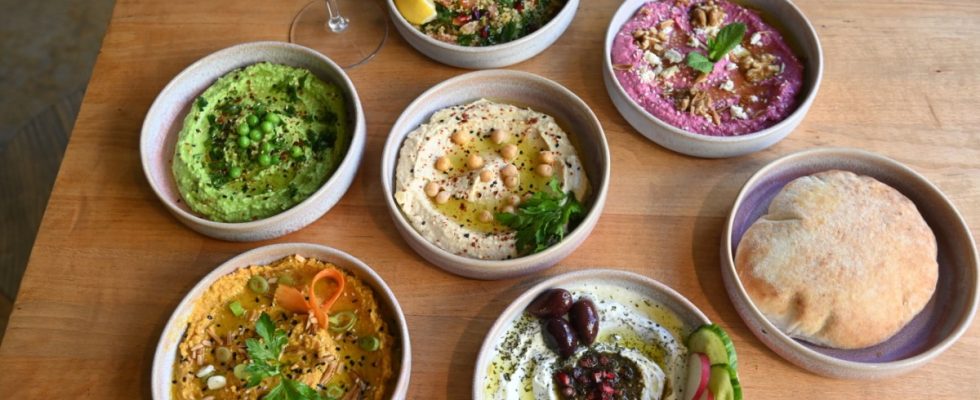A greeting or salutation in Arabic is more warm than in German. “Habibi” means something like “darling”, “my dear” or “sweetheart”. And Habibis can be found everywhere. “I say this to my children as well as to my friends or my chef,” says Munich restaurateur and Lebanese native Samir Krawczyk. In Lehel, where Krawczyk opened the “Petit Habibi” café on Thierschstraße a few months ago, there are now Habibis on every corner.
Just last summer, a new offshoot of the Levantine restaurant “Servus Habibi” celebrated its opening on Liebigstrasse not far from “Petit Habibi”. And anyone who suspects a connected Habibihood behind “Servus Habibi” and “Petit Habibi” is not entirely wrong. Krawczyk was one of the founders of “Servus Habibi” and sold his shares three months ago. He only kept the “Servus Habibi” franchise in Ingolstadt Village.
The concept of Krawczyk’s new “Petit Habibi” is similar to his previous ones; he wants to make hummus and the like cool and, above all, make it visually appealing. “I make Levantine food for the Instagrammer Alman,” he jokes. The “Petit Habibi” has a certain coffee shop feel to it, which is partly due to the opening times – during the week it is open every day from eight o’clock – but also to the service, furnishings and offerings.
The “Petit Habibi” consists of an open room with a service counter and refrigerated counter where you place your order. Even though Krawczyk is alone behind the counter, you feel well advised and not alone like in an anonymous coffee shop chain. Every order comes with a casual saying or a short chat.
The predominant color in the café is lemon yellow, starting from the stick figure logo on the wall, through randomly meandering, never-ending traces of yellow paint on the walls and ceiling, all the way to the yellow tiles on the counter and bar. Three large windows, which take up almost the entire outer wall facing Thierschstrasse, let in lots of light.
In addition to Levantine food, Samir Krawczyk (right) also offers classics such as Franzbrötchen or pain au chocolat.
(Photo: Stephan Rumpf)
The benches and tables made of light, unsealed wood that Krawczyk made himself along these windows also create a friendly, relaxed atmosphere. The do-it-yourself look of the furniture is intentional. “If it looks too fancy, people are hesitant to go in,” says Krawczyk. “Plus, I have a closer connection to the store when I do everything myself. And it’s cheaper too. It may not look perfect, but I like it.”
The handmade quality continues in the food offering. Cakes like the carrot cake or the banana and blueberry bread (3.90 euros each) are homemade. Small, sweet bites are also home-made, but their richness should not be underestimated, such as the energy ball made from dates, peanut butter and coconut flakes (two euros). Krawczyk calls it “Habibi Snickers” or “healthy Snickers.” There are also Franzbrötchen (2.80 euros), croissants (2.40 euros), buttered pretzels (1.90 euros) and variously topped panini (6.50 euros), pretzel sticks (4.90 euros) and wraps (from 7. 50 Euros).
There are few meat dishes on the menu
You can also choose from many different mezzes for a hearty breakfast. There are four different types of hummus on the menu, from “Hummus Classique” (6.90 euros) to “Golden Boy” with carrot or “Pink Lady” with beetroot (7.50 euros each). There is also the oriental eggplant puree “Baba Ganoush”, tabbouleh salad and various labneh dips (7.50 euros each). The baked cauliflower (9.50 euros), a whole head with colorful toppings of sauces, herbs and pomegranate seeds, is an eye-catcher, but better shared. Likewise the “Habibi platters” with mixed mezze and grilled vegetables (13 euros), halloumi cheese (13.50 euros), or chicken (14 euros).
The mezze platter and the chicken wrap are two of the few meat dishes on the Petit Habibi menu. But Krawczyk doesn’t abstain from meat for ethical or religious reasons: “I just don’t miss it.” The daily changing lunch dishes (between eight and 15 euros) are also predominantly vegetarian, such as lentil soup with pita or oriental okra stew.
At any time of the day there are freshly squeezed juices, the ingredients of which you can put together (4.30 euros for apple, carrot, orange and ginger), and coffee classics such as cappuccino (3.50 euros) and espresso (1.90 euros). The range of drinks at “Petit Habibi” is to be expanded. There is already a liquor license and Krawczyk could imagine opening in the evenings in the new year. A weekend brunch is also conceivable, but a long way off. After all, his “little treasure” is still in its infancy.
“Petit Habibi”, Thierschstraße 44, 80538 Munich, telephone: 0163-2110589, opening hours: Monday to Friday 8 a.m. to 5 p.m

